The Cambridge History of China. Vol. 06. Alien Regimes and Border States, 907-1368
Подождите немного. Документ загружается.

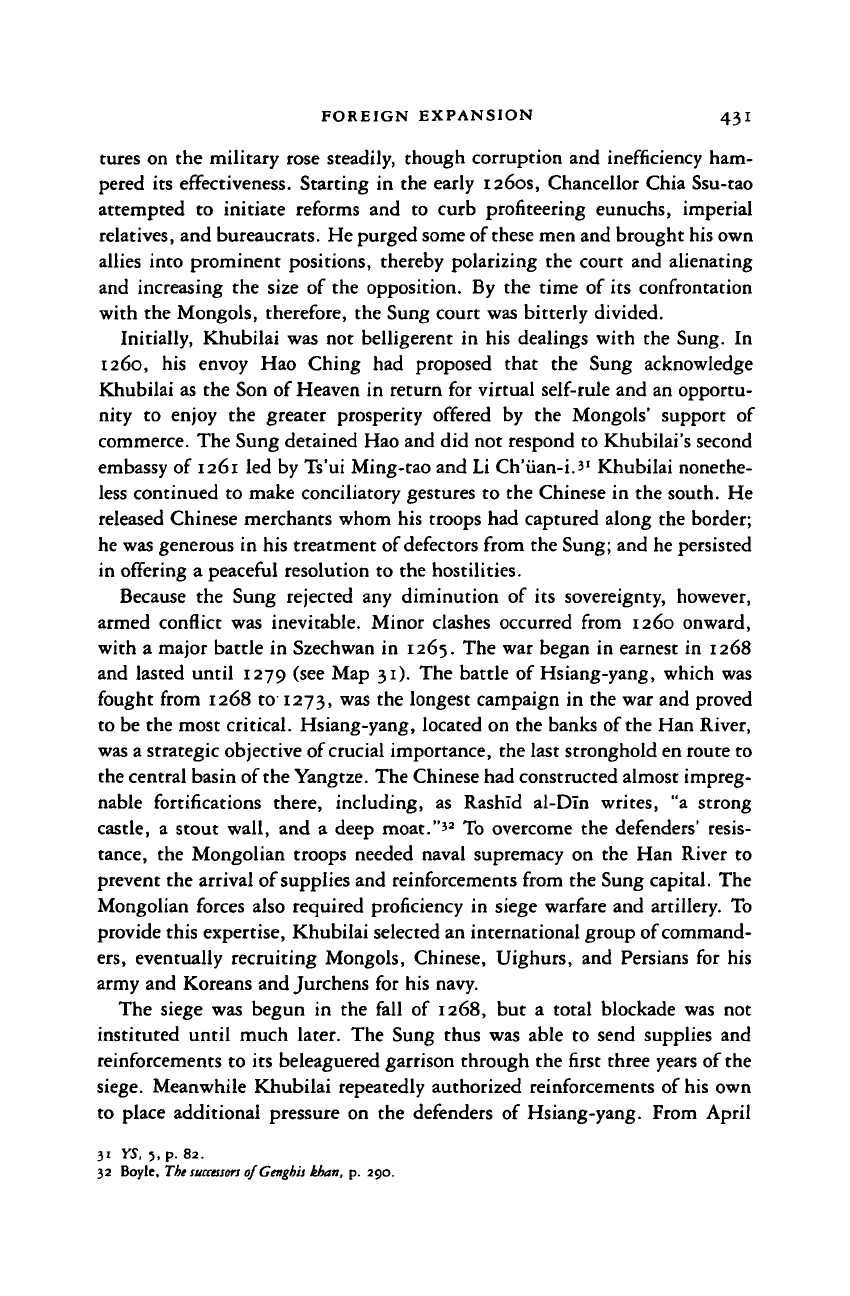
FOREIGN EXPANSION 431
tures on the military rose steadily, though corruption and inefficiency ham-
pered its effectiveness. Starting in the early 1260s, Chancellor Chia Ssu-tao
attempted to initiate reforms and to curb profiteering eunuchs, imperial
relatives, and bureaucrats. He purged some of these men and brought his own
allies into prominent positions, thereby polarizing the court and alienating
and increasing the size of the opposition. By the time of its confrontation
with the Mongols, therefore, the Sung court was bitterly divided.
Initially, Khubilai was not belligerent in his dealings with the Sung. In
1260,
his envoy Hao Ching had proposed that the Sung acknowledge
Khubilai as the Son of Heaven in return for virtual self-rule and an opportu-
nity to enjoy the greater prosperity offered by the Mongols' support of
commerce. The Sung detained Hao and did not respond to Khubilai's second
embassy of 1261 led by Ts'ui Ming-tao and Li Ch'iian-i.
3
' Khubilai nonethe-
less continued to make conciliatory gestures to the Chinese in the south. He
released Chinese merchants whom his troops had captured along the border;
he was generous in his treatment of defectors from the Sung; and he persisted
in offering a peaceful resolution to the hostilities.
Because the Sung rejected any diminution of its sovereignty, however,
armed conflict was inevitable. Minor clashes occurred from 1260 onward,
with a major battle in Szechwan in 1265. The war began in earnest in 1268
and lasted until 1279 (see Map 31). The battle of Hsiang-yang, which was
fought from 1268 to 1273, was the longest campaign in the war and proved
to be the most critical. Hsiang-yang, located on the banks of the Han River,
was a strategic objective of crucial importance, the last stronghold en route to
the central basin of the Yangtze. The Chinese had constructed almost impreg-
nable fortifications there, including, as Rashld al-Dln writes, "a strong
castle, a stout wall, and a deep moat."'
2
To overcome the defenders' resis-
tance, the Mongolian troops needed naval supremacy on the Han River to
prevent the arrival of supplies and reinforcements from the Sung capital. The
Mongolian forces also required proficiency in siege warfare and artillery. To
provide this expertise, Khubilai selected an international group of command-
ers,
eventually recruiting Mongols, Chinese, Uighurs, and Persians for his
army and Koreans and Jurchens for his navy.
The siege was begun in the fall of 1268, but a total blockade was not
instituted until much later. The Sung thus was able to send supplies and
reinforcements to its beleaguered garrison through the first three years of the
siege. Meanwhile Khubilai repeatedly authorized reinforcements of his own
to place additional pressure on the defenders of Hsiang-yang. From April
31
YS, 5,
p.
82.
32 Boyle, The
successor!
of Genghis khan,
p. 290.
Cambridge Histories Online © Cambridge University Press, 2008
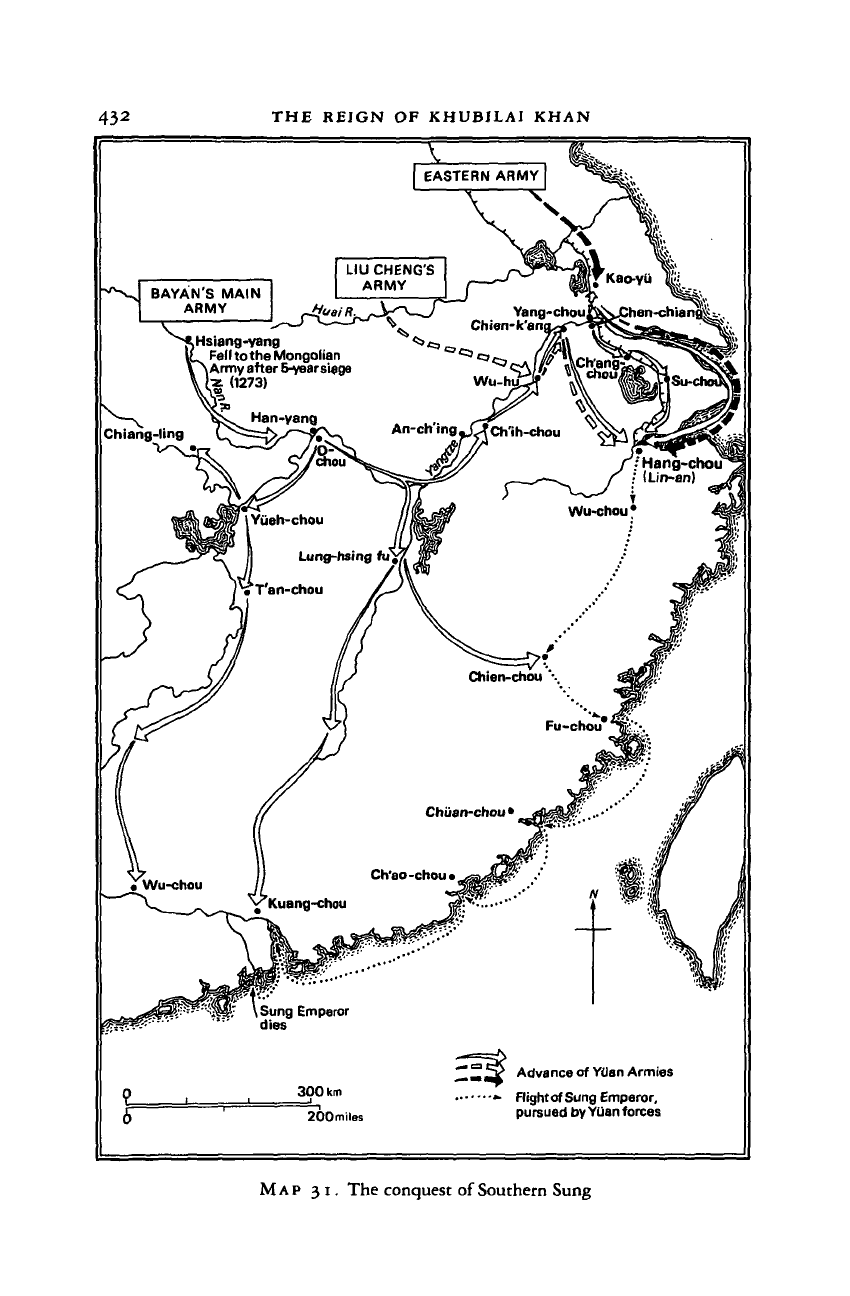
432
THE REIGN OF KHUBILAI KHAN
Hsiang-yang
Fellto the Mongolian
Army after
6-year
siege
(1273)
»• Right
of Sung
Emperor,
pursued
by Yuan
forces
MAP
31. The conquest of Southern Sung
Cambridge Histories Online © Cambridge University Press, 2008
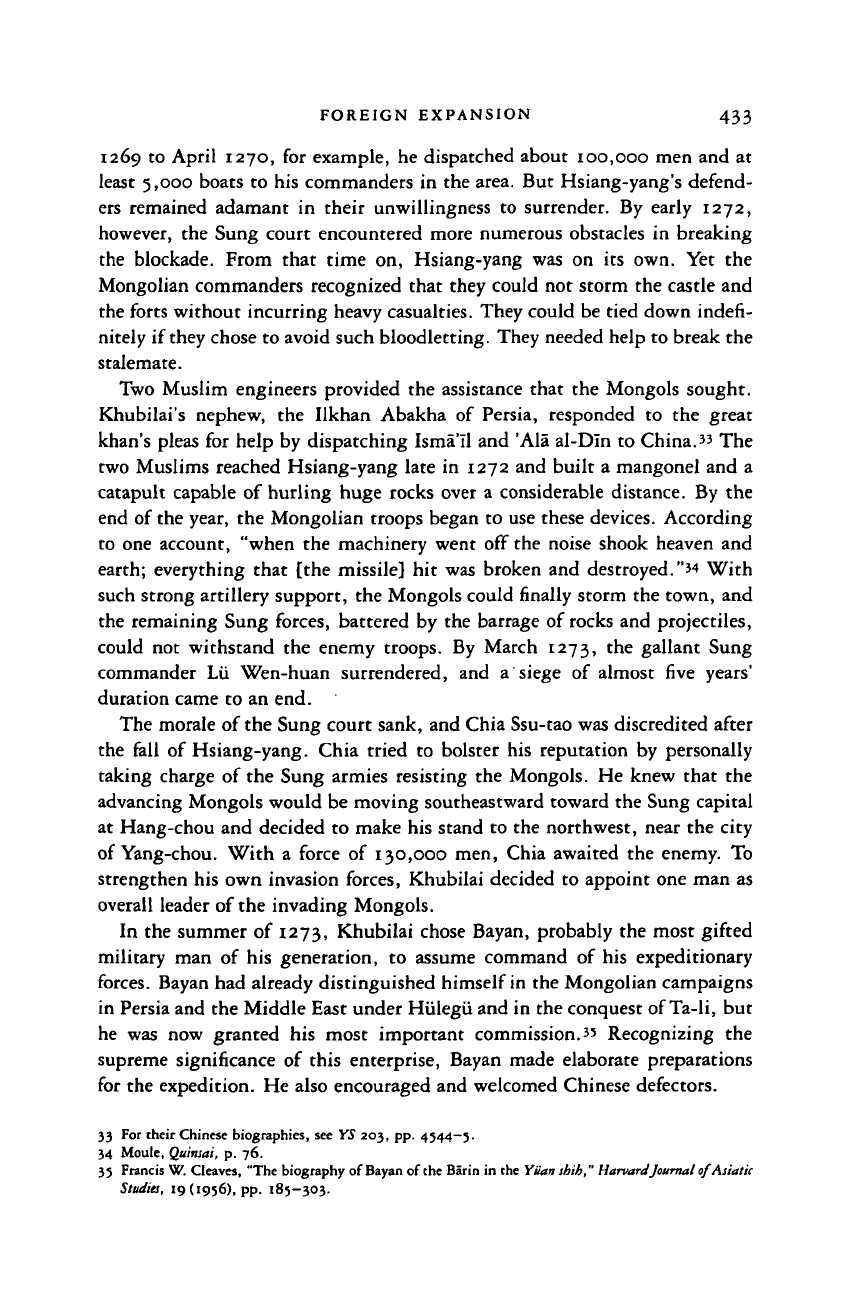
FOREIGN EXPANSION 433
1269 to April 1270, for example, he dispatched about 100,000 men and at
least
5,000
boats to his commanders in the area. But Hsiang-yang's defend-
ers remained adamant in their unwillingness to surrender. By early 1272,
however, the Sung court encountered more numerous obstacles in breaking
the blockade. From that time on, Hsiang-yang was on its own. Yet the
Mongolian commanders recognized that they could not storm the castle and
the forts without incurring heavy casualties. They could be tied down indefi-
nitely if they chose to avoid such bloodletting. They needed help to break the
stalemate.
Two Muslim engineers provided the assistance that the Mongols sought.
Khubilai's nephew, the Ilkhan Abakha of Persia, responded to the great
khan's pleas for help by dispatching Isma'Il and 'Ala al-Dln to China.
33
The
two Muslims reached Hsiang-yang late in 1272 and built a mangonel and a
catapult capable of hurling huge rocks over a considerable distance. By the
end of the year, the Mongolian troops began to use these devices. According
to one account, "when the machinery went off the noise shook heaven and
earth; everything that [the missile] hit was broken and destroyed. "^ With
such strong artillery support, the Mongols could finally storm the town, and
the remaining Sung forces, battered by the barrage of rocks and projectiles,
could not withstand the enemy troops. By March 1273, the gallant Sung
commander Lii Wen-huan surrendered, and a siege of almost five years'
duration came to an end.
The morale of the Sung court sank, and Chia Ssu-tao was discredited after
the fall of Hsiang-yang. Chia tried to bolster his reputation by personally
taking charge of the Sung armies resisting the Mongols. He knew that the
advancing Mongols would be moving southeastward toward the Sung capital
at Hang-chou and decided to make his stand to the northwest, near the city
of Yang-chou. With a force of 130,000 men, Chia awaited the enemy. To
strengthen his own invasion forces, Khubilai decided to appoint one man as
overall leader of the invading Mongols.
In the summer of 1273, Khubilai chose Bayan, probably the most gifted
military man of his generation, to assume command of his expeditionary
forces. Bayan had already distinguished himself in the Mongolian campaigns
in Persia and the Middle East under Hiilegu and in the conquest of
Ta-li,
but
he was now granted his most important commission.
3
' Recognizing the
supreme significance of this enterprise, Bayan made elaborate preparations
for the expedition. He also encouraged and welcomed Chinese defectors.
33 For their Chinese biographies, see YS 203, pp. 4544-5.
34 Moule, Quintal, p. 76.
35 Francis W. Cleaves, "The biography of Bayan of the Barin in the Yiianshih," Harvard Journal of Asiatic
Studies, 19(1956), pp. 185-303.
Cambridge Histories Online © Cambridge University Press, 2008
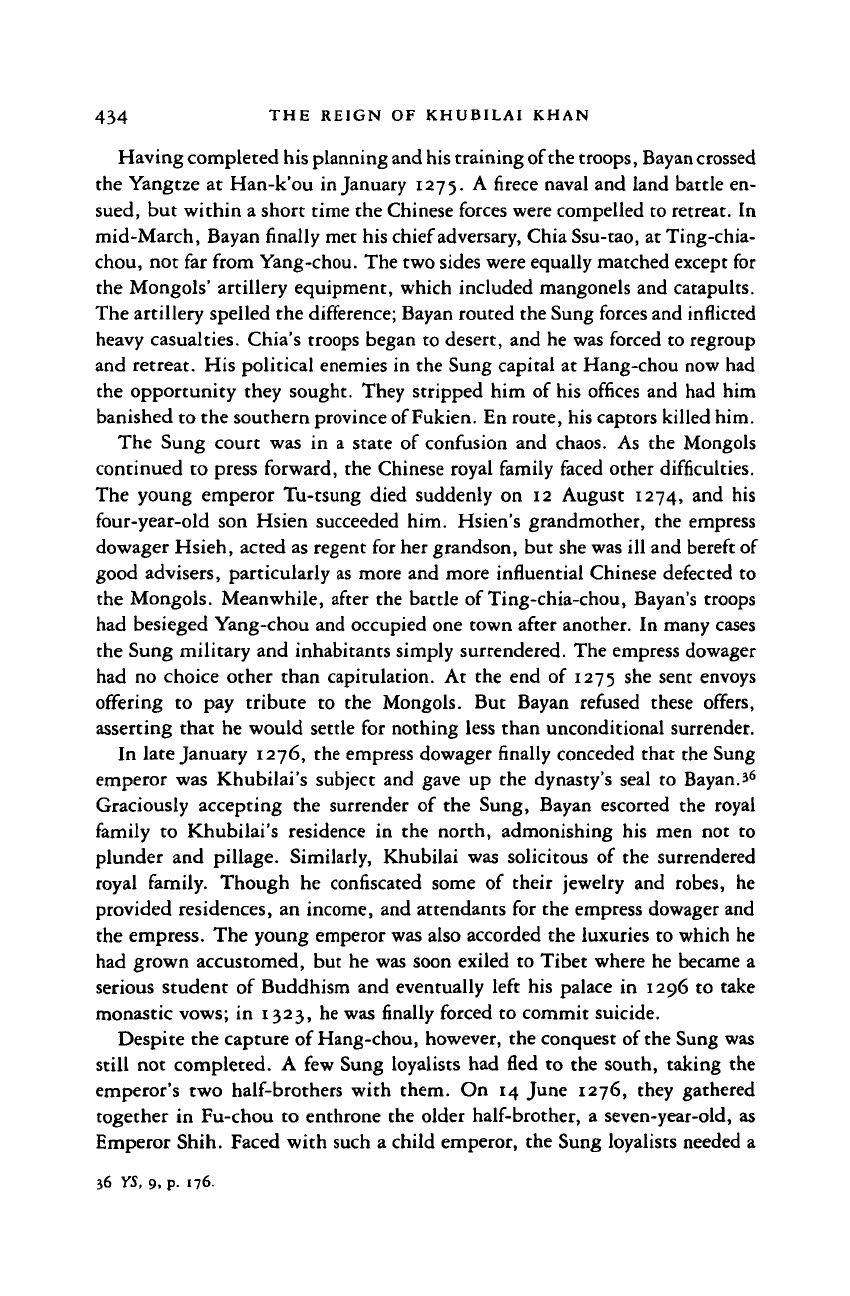
434
TH
E REIGN OF KHUBILAI KHAN
Having completed his planning and his training of the troops, Bayan crossed
the Yangtze
at
Han-k'ou in January 1275.
A
firece
naval and land battle en-
sued, but within a short time the Chinese forces were compelled to retreat.
In
mid-March, Bayan finally met his chief adversary, Chia Ssu-tao, at Ting-chia-
chou, not far from Yang-chou. The two sides were equally matched except for
the Mongols' artillery equipment, which included mangonels and catapults.
The artillery spelled the difference; Bayan routed the Sung forces and inflicted
heavy casualties. Chia's troops began to desert, and he was forced to regroup
and retreat. His political enemies in the Sung capital
at
Hang-chou now had
the opportunity they sought. They stripped him
of
his offices and had him
banished to the southern province of Fukien. En route, his captors killed him.
The Sung court was
in a
state
of
confusion and chaos.
As
the Mongols
continued to press forward, the Chinese royal family faced other difficulties.
The young emperor Tu-tsung died suddenly
on 12
August 1274,
and his
four-year-old
son
Hsien succeeded him. Hsien's grandmother, the empress
dowager Hsieh, acted as regent for her grandson, but she was ill and bereft of
good advisers, particularly as more and more influential Chinese defected
to
the Mongols. Meanwhile, after the battle of Ting-chia-chou, Bayan's troops
had besieged Yang-chou and occupied one town after another. In many cases
the Sung military and inhabitants simply surrendered. The empress dowager
had no choice other than capitulation.
At
the end
of
1275 she sent envoys
offering
to pay
tribute
to the
Mongols.
But
Bayan refused these offers,
asserting that he would settle for nothing less than unconditional surrender.
In late January 1276, the empress dowager finally conceded that the Sung
emperor was Khubilai's subject and gave
up
the dynasty's seal
to
Bayan.
36
Graciously accepting
the
surrender
of
the Sung, Bayan escorted
the
royal
family
to
Khubilai's residence
in the
north, admonishing
his
men
not to
plunder
and
pillage. Similarly, Khubilai was solicitous
of
the surrendered
royal family. Though
he
confiscated some
of
their jewelry
and
robes,
he
provided residences, an income, and attendants for the empress dowager and
the empress. The young emperor was also accorded the luxuries to which he
had grown accustomed, but he was soon exiled to Tibet where he became
a
serious student
of
Buddhism and eventually left his palace
in
1296
to
take
monastic vows;
in
1323, he was finally forced to commit suicide.
Despite the capture of Hang-chou, however, the conquest of
the
Sung was
still
not
completed.
A
few Sung loyalists had fled
to
the south, taking
the
emperor's two half-brothers with them.
On
14 June 1276, they gathered
together
in
Fu-chou
to
enthrone the older half-brother,
a
seven-year-old,
as
Emperor Shih. Faced with such a child emperor, the Sung loyalists needed
a
36 YS, 9, p. 176.
Cambridge Histories Online © Cambridge University Press, 2008
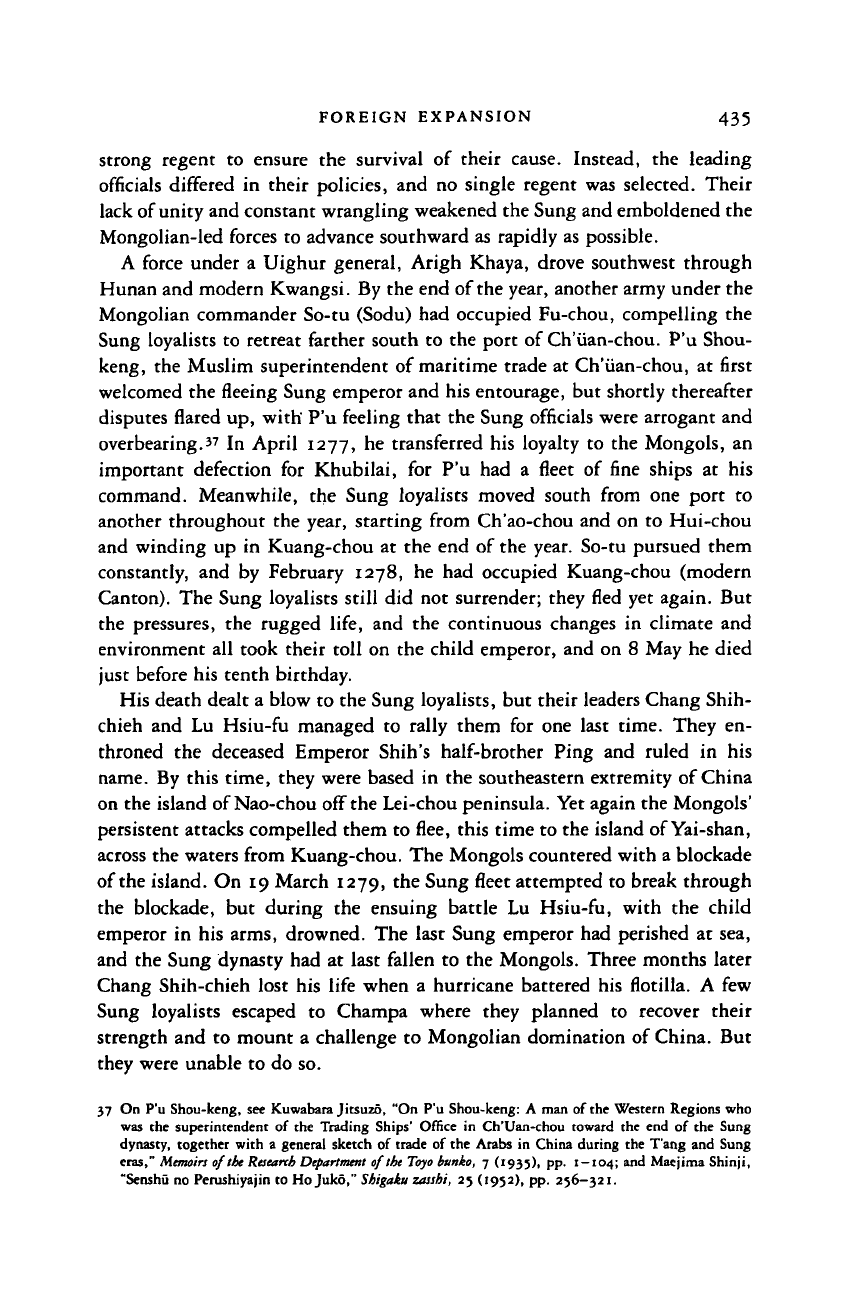
FOREIGN EXPANSION 435
strong regent to ensure the survival of their cause. Instead, the leading
officials differed in their policies, and no single regent was selected. Their
lack of unity and constant wrangling weakened the Sung and emboldened the
Mongolian-led forces to advance southward as rapidly as possible.
A force under a Uighur general, Arigh Khaya, drove southwest through
Hunan and modern Kwangsi. By the end of
the
year, another army under the
Mongolian commander So-tu (Sodu) had occupied Fu-chou, compelling the
Sung loyalists to retreat farther south to the port of Ch'uan-chou. P'u Shou-
keng, the Muslim superintendent of maritime trade at Ch'iian-chou, at first
welcomed the fleeing Sung emperor and his entourage, but shortly thereafter
disputes flared up, with P'u feeling that the Sung officials were arrogant and
overbearing.37 In April 1277, he transferred his loyalty to the Mongols, an
important defection for Khubilai, for P'u had a fleet of fine ships at his
command. Meanwhile, the Sung loyalists moved south from one port to
another throughout the year, starting from Ch'ao-chou and on to Hui-chou
and winding up in Kuang-chou at the end of the year. So-tu pursued them
constantly, and by February 1278, he had occupied Kuang-chou (modern
Canton). The Sung loyalists still did not surrender; they fled yet again. But
the pressures, the rugged life, and the continuous changes in climate and
environment all took their toll on the child emperor, and on 8 May he died
just before his tenth birthday.
His death dealt a blow to the Sung loyalists, but their leaders Chang Shih-
chieh and Lu Hsiu-fu managed to rally them for one last time. They en-
throned the deceased Emperor Shih's half-brother Ping and ruled in his
name. By this time, they were based in the southeastern extremity of China
on the island of Nao-chou off
the
Lei-chou peninsula. Yet again the Mongols'
persistent attacks compelled them to flee, this time to the island of Yai-shan,
across the waters from Kuang-chou. The Mongols countered with a blockade
of the island. On 19 March 1279, the Sung fleet attempted to break through
the blockade, but during the ensuing battle Lu Hsiu-fu, with the child
emperor in his arms, drowned. The last Sung emperor had perished at sea,
and the Sung dynasty had at last fallen to the Mongols. Three months later
Chang Shih-chieh lost his life when a hurricane battered his flotilla. A few
Sung loyalists escaped to Champa where they planned to recover their
strength and to mount a challenge to Mongolian domination of China. But
they were unable to do so.
37 On P'u Shou-keng, see Kuwabara Jitsuzo, "On P'u Shou-keng: A man of the Western Regions who
was the superintendent of the Trading Ships' Office in Ch'Uan-chou toward the end of the Sung
dynasty, together with a general sketch of trade of the Arabs in China during the T'ang and Sung
eras,"
Memoirs
of
the
Raearth Department of the
Toyo
bunko,
7 (1935), pp. 1—104; and Maejima Shinji,
"Senshu no Perushiyajin to Ho Juko," Shigaku zasshi, 25 (1932), pp. 256—321.
Cambridge Histories Online © Cambridge University Press, 2008
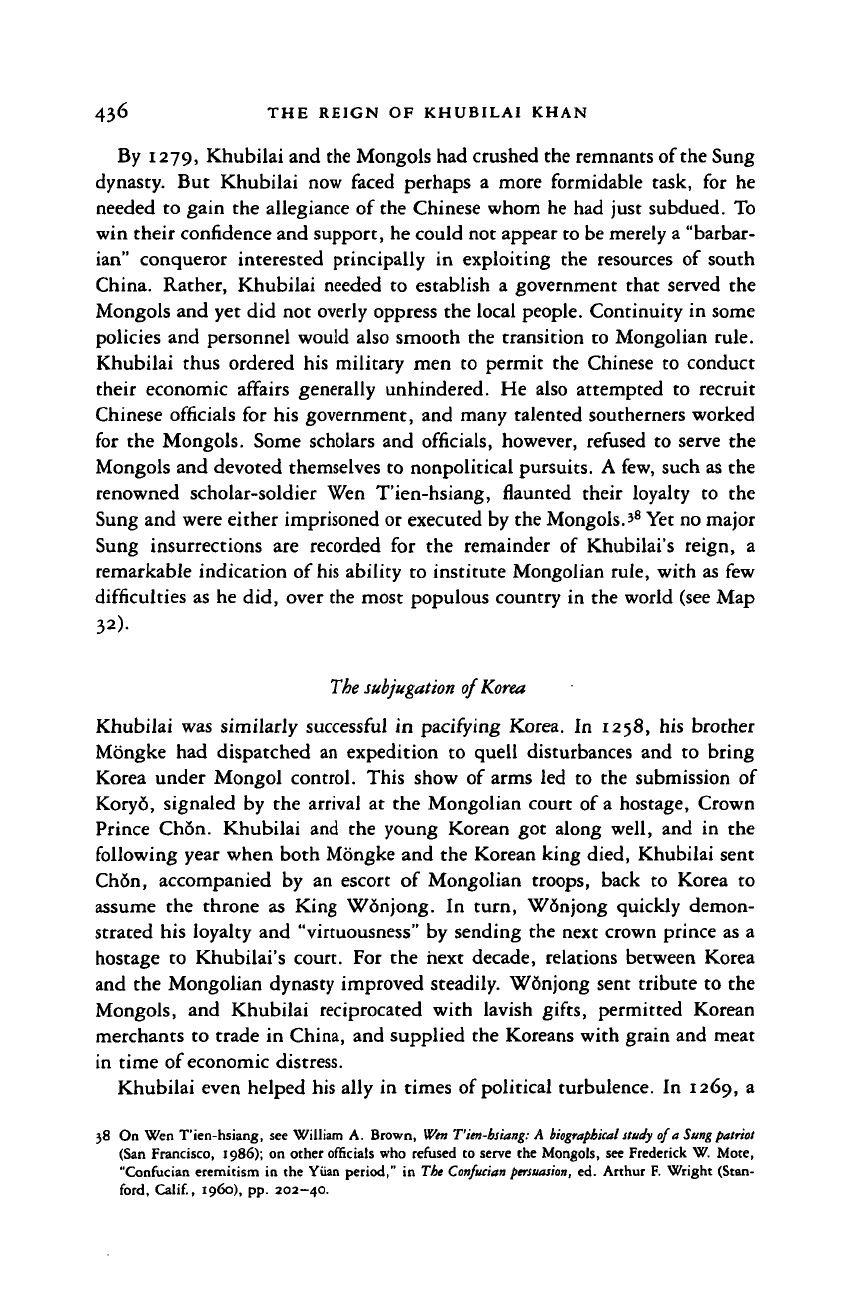
436 THE REIGN OF KHUBILA1 KHAN
By 1279, Khubilai and the Mongols had crushed the remnants of
the
Sung
dynasty. But Khubilai now faced perhaps a more formidable task, for he
needed to gain the allegiance of the Chinese whom he had just subdued. To
win their confidence and support, he could not appear to be merely a "barbar-
ian" conqueror interested principally in exploiting the resources of south
China. Rather, Khubilai needed to establish a government that served the
Mongols and yet did not overly oppress the local people. Continuity in some
policies and personnel would also smooth the transition to Mongolian rule.
Khubilai thus ordered his military men to permit the Chinese to conduct
their economic affairs generally unhindered. He also attempted to recruit
Chinese officials for his government, and many talented southerners worked
for the Mongols. Some scholars and officials, however, refused to serve the
Mongols and devoted themselves to nonpolitical pursuits. A few, such as the
renowned scholar-soldier Wen T'ien-hsiang, flaunted their loyalty to the
Sung and were either imprisoned or executed by the Mongols.
38
Yet no major
Sung insurrections are recorded for the remainder of Khubilai's reign, a
remarkable indication of
his
ability to institute Mongolian rule, with as few
difficulties as he did, over the most populous country in the world (see Map
32)-
The
subjugation
of Korea
Khubilai was similarly successful in pacifying Korea. In 1258, his brother
Mongke had dispatched an expedition to quell disturbances and to bring
Korea under Mongol control. This show of arms led to the submission of
Koryd, signaled by the arrival at the Mongolian court of a hostage, Crown
Prince Chon. Khubilai and the young Korean got along well, and in the
following year when both Mongke and the Korean king died, Khubilai sent
Ch6n, accompanied by an escort of Mongolian troops, back to Korea to
assume the throne as King Wfinjong. In turn, W6njong quickly demon-
strated his loyalty and "virtuousness" by sending the next crown prince as a
hostage to Khubilai's court. For the next decade, relations between Korea
and the Mongolian dynasty improved steadily. W6njong sent tribute to the
Mongols, and Khubilai reciprocated with lavish gifts, permitted Korean
merchants to trade in China, and supplied the Koreans with grain and meat
in time of economic distress.
Khubilai even helped his ally in times of political turbulence. In 1269, a
38 On Wen T'ien-hsiang, see William A. Brown,
Wen
T'ien-hsiang:
A
biographical study
of a
Sung patriot
(San Francisco, 1986); on other officials who refused to serve the Mongols, see Frederick W. Mote,
"Confucian eremitism in the Yuan period," in The
Confucian
persuasion,
ed. Arthur F. Wright (Stan-
ford,
Calif.,
i960), pp. 202-40.
Cambridge Histories Online © Cambridge University Press, 2008
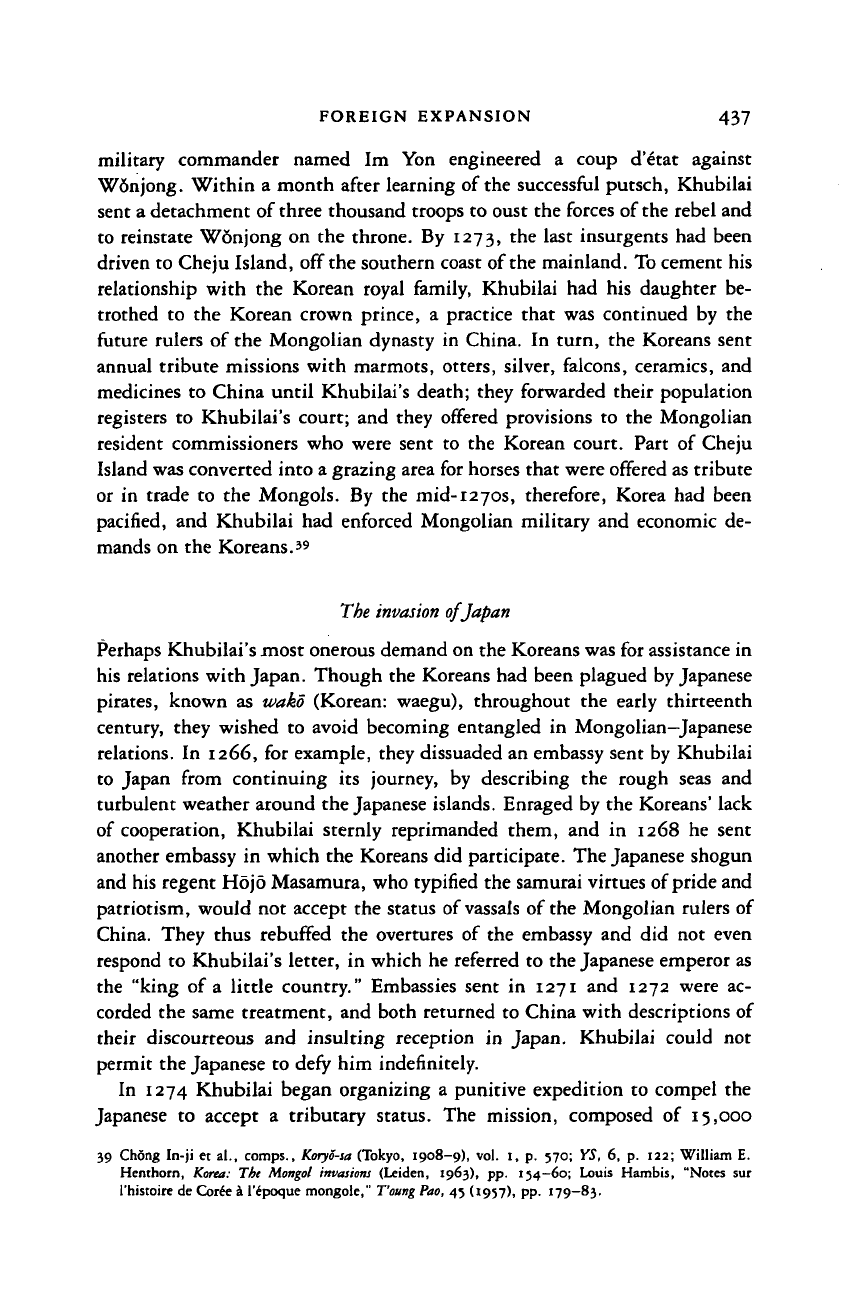
FOREIGN EXPANSION 437
military commander named Im Yon engineered a coup d'etat against
W6njong. Within a month after learning of the successful putsch, Khubilai
sent a detachment of three thousand troops to oust the forces of
the
rebel and
to reinstate W6njong on the throne. By 1273, the last insurgents had been
driven to Cheju Island, off the southern coast of
the
mainland. To cement his
relationship with the Korean royal family, Khubilai had his daughter be-
trothed to the Korean crown prince, a practice that was continued by the
future rulers of the Mongolian dynasty in China. In turn, the Koreans sent
annual tribute missions with marmots, otters, silver, falcons, ceramics, and
medicines to China until Khubilai's death; they forwarded their population
registers to Khubilai's court; and they offered provisions to the Mongolian
resident commissioners who were sent to the Korean court. Part of Cheju
Island was converted into a grazing area for horses that were offered as tribute
or in trade to the Mongols. By the mid-i27os, therefore, Korea had been
pacified, and Khubilai had enforced Mongolian military and economic de-
mands on the Koreans.
39
The
invasion
of Japan
Perhaps Khubilai's most onerous demand on the Koreans was for assistance in
his relations with Japan. Though the Koreans had been plagued by Japanese
pirates, known as wako (Korean: waegu), throughout the early thirteenth
century, they wished to avoid becoming entangled in Mongolian—Japanese
relations. In 1266, for example, they dissuaded an embassy sent by Khubilai
to Japan from continuing its journey, by describing the rough seas and
turbulent weather around the Japanese islands. Enraged by the Koreans' lack
of cooperation, Khubilai sternly reprimanded them, and in 1268 he sent
another embassy in which the Koreans did participate. The Japanese shogun
and his regent Hojo Masamura, who typified the samurai virtues of pride and
patriotism, would not accept the status of
vassals
of the Mongolian rulers of
China. They thus rebuffed the overtures of the embassy and did not even
respond to Khubilai's letter, in which he referred to the Japanese emperor as
the "king of a little country." Embassies sent in 1271 and 1272 were ac-
corded the same treatment, and both returned to China with descriptions of
their discourteous and insulting reception in Japan. Khubilai could not
permit the Japanese to defy him indefinitely.
In 1274 Khubilai began organizing a punitive expedition to compel the
Japanese to accept a tributary status. The mission, composed of 15,000
39 Chong In-ji et al., comps., Koryo-sa (Tokyo, 1908-9), vol. 1, p. 570; YS, 6, p. 122; William E.
Henthorn, Korea: The Mongol invasions (Leiden, 1963), pp. 154—60; Louis Hambis, "Notes sur
l'histoire de Coree a l'epoque mongole,"
T'oung
Pao, 45 (1957), pp. :79-83.
Cambridge Histories Online © Cambridge University Press, 2008

Cambridge Histories Online © Cambridge University Press, 2008
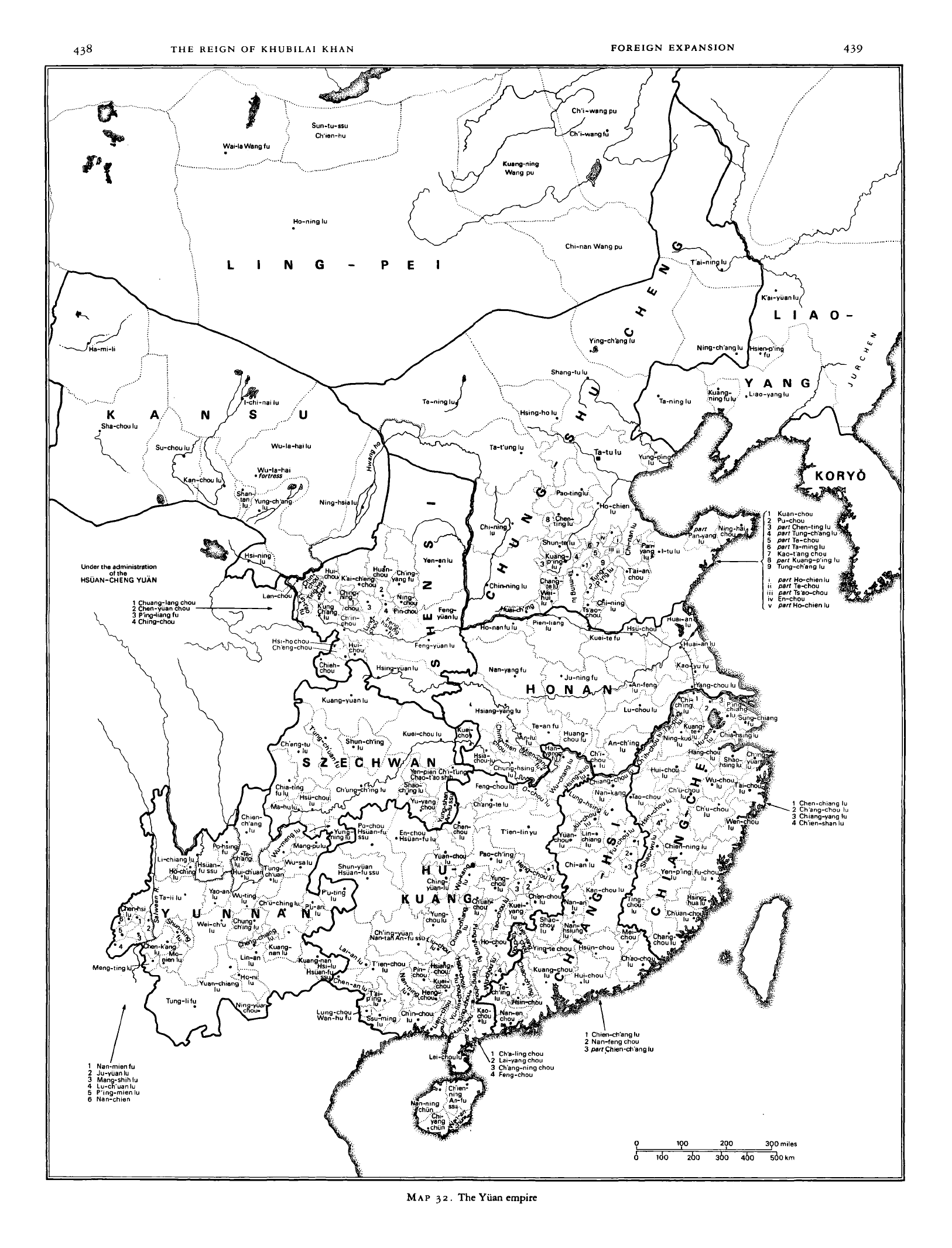
438
THE
REIGN
OF
KHUBILAI
KHAN
FOREIGN
EXPANSION
439
MAP
32 . The
Yuan
empire
LING-
P E I
Ho-ning
lu
Wai-la
Wang
f
u
Sun-tu-ssu
Ch'ien-hu
Kuang-ning
Wang
pu
Chi-nan
Wang
pu
Ch'i-wang
pu
-'"^IVi-wang
fu
_/hia-mi-li
V
/
f l-chi-nai lu \^
K
A/\ N y S U ^\
Sha-choulu jr
:
Su-chouju/ ;f / Wu-la-hailu / J/Y
V V_ '•- Wu-la-hai *\
W
„ •'. ,1
•fortress
f
\Kan-chou
lu\ '. i
S
S
^
AN
^'
/
^^^W±^>^^
Ning-hsialJ^| I
Under
the administration
of
the
HSUAN-CHENG
YUAN
1 Chuang-lang chou
2 Chen-yuan chou -
3
P'ing-liang
fu
4 Ching-chou
Te-ningkjy
ft (1 Kuan-chou
JB$&
f
3
part
Chen-ting lu -slgJ
4
part
Tung-chang lu
5
part
Te-chou m
6
part
Ta-ming lu
7 Kao-t'ang chou ^
.
/ 8
part
Kuang-p'mg lu %.
9 Tung-chang lu jjp
i
part
Ho-chienlu
n
port
Te-chou
jJSfijK
in
part
Ts'ao-chou ^yjp
iv
En-chou
v
part
Ho-chien lu
KORYO
Y
A N G /
:
,Liao-yanglu
J
L
I A O -
j K'ai-yuanlu/
...T'ai-ninojuy^
Ning-ch'anglu
iHsien-ping
Kuang-
Ta-ninglu
""
>
9
fulu
Shang-tu lu
Ying-ch'ang
lu
'•Hsing-ho
lu
Ta-t'ung lu
1 Chen-chiang lu
2 Ch"ang-chou lu
3 Chiang-yang lu
4 Ch'ien-shan lu
\
1 Chten-ch'ang tu
2
Nan-feng
chou
3
part
Chten-ch'ang lu
\
1 Ch'a-ling chou
2
Lai-yang
chou
3 Ch'ang-ning chou
.
4 Feng-chou
0 1£0 200 300 miles
6 l3o 200 300 400
ioO km
Lung-chou.-I
Wan-hu
fu j
/
1 Nan-mien fu
2 Ju-yiianlu
3 Mang-shihlu
4
Lu-cn'uanlu
5 P'ing-mienlu
6 Nan-chien
Shun-yuan
Hsuan-fu ssu
•
T'ien-linyu
vCh'ang-te
lu
Feng-chouiiT?
Nan-yang
fu
H
ON
A-^N^
.....
-—^rt
w
r^
v
"
~
S 2%E C H
W/A
N
Cambridge Histories Online © Cambridge University Press, 2008
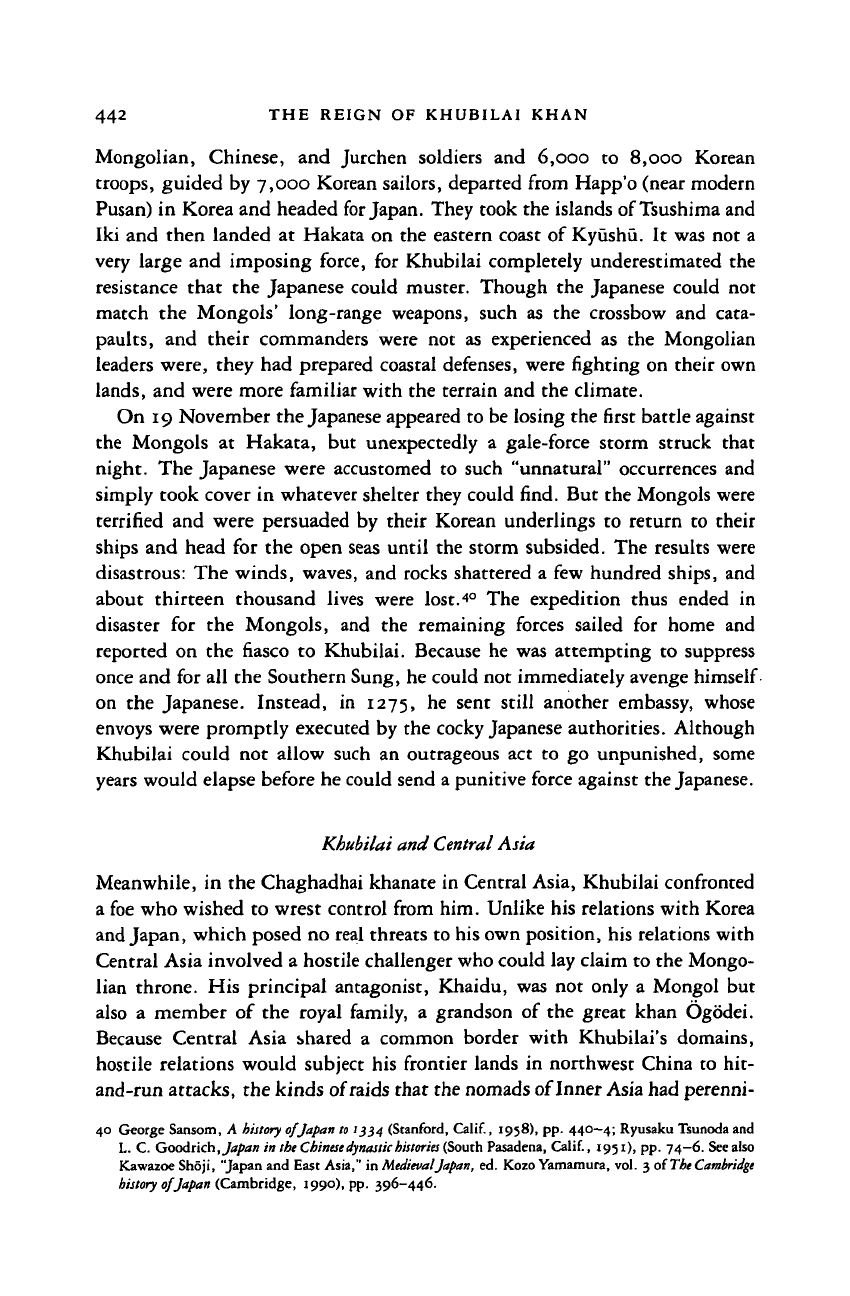
442 THE REIGN OF KHUBILAI KHAN
Mongolian, Chinese,
and
Jurchen soldiers
and
6,000
to
8,ooo
Korean
troops, guided by 7,000 Korean sailors, departed from Happ'o (near modern
Pusan) in Korea and headed for
Japan.
They took the islands of Tsushima and
Iki and then landed
at
Hakata on the eastern coast of Kyushu.
It
was not a
very large and imposing force, for Khubilai completely underestimated the
resistance that the Japanese could muster. Though the Japanese could not
match
the
Mongols' long-range weapons, such
as
the crossbow and cata-
paults,
and
their commanders were
not as
experienced
as the
Mongolian
leaders were, they had prepared coastal defenses, were fighting on their own
lands,
and were more familiar with the terrain and the climate.
On 19 November the Japanese appeared to be losing the first battle against
the Mongols
at
Hakata,
but
unexpectedly
a
gale-force storm struck that
night. The Japanese were accustomed
to
such "unnatural" occurrences and
simply took cover in whatever shelter they could find. But the Mongols were
terrified and were persuaded by their Korean underlings
to
return
to
their
ships and head for the open seas until the storm subsided. The results were
disastrous: The winds, waves, and rocks shattered a few hundred ships, and
about thirteen thousand lives were lost.
40
The expedition thus ended
in
disaster
for the
Mongols,
and the
remaining forces sailed
for
home
and
reported
on
the fiasco
to
Khubilai. Because he was attempting to suppress
once and for all the Southern Sung, he could not immediately avenge himself
on the Japanese. Instead,
in
1275,
he
sent still another embassy, whose
envoys were promptly executed by the cocky Japanese authorities. Although
Khubilai could not allow such an outrageous act
to
go unpunished, some
years would elapse before he could send a punitive force against the Japanese.
Khubilai and
Central
Asia
Meanwhile, in the Chaghadhai khanate in Central Asia, Khubilai confronted
a foe who wished to wrest control from him. Unlike his relations with Korea
and Japan, which posed no real threats to his own position, his relations with
Central Asia involved a hostile challenger who could lay claim to the Mongo-
lian throne. His principal antagonist, Khaidu, was not only
a
Mongol but
also
a
member
of
the royal family,
a
grandson
of
the great khan Ogodei.
Because Central Asia shared
a
common border with Khubilai's domains,
hostile relations would subject his frontier lands
in
northwest China to hit-
and-run attacks, the kinds of raids that the nomads of Inner Asia had perenni-
40 George Sansom,
A
history
of Japan
to
1334 (Stanford,
Calif.,
1958), pp. 440-4; Ryusaku Tsunoda and
L. C. Goodrich, Japan in
the Chinese dynastic histories
(South Pasadena,
Calif.,
1951), pp. 74—6.
See
also
Kawazoe Shoji, "Japan and East Asia," in Medieval
Japan,
ed. Kozo Yamamura, vol. 3 of
The Cambridge
history
of Japan (Cambridge, 1990), pp. 396-446.
Cambridge Histories Online © Cambridge University Press, 2008
